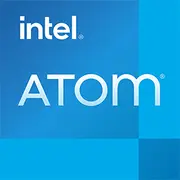Intel Atom x7-E3950

Intel Atom x7-E3950: A Compact Processor for Basic Tasks. Full Review for 2025
Introduction
In an era where manufacturers are betting on multi-core behemoths and neural accelerators, modest processors for budget devices remain in the shadows. However, these processors ensure access to technology for millions of users. The Intel Atom x7-E3950 is a typical representative of this category. Designed back in 2016 as part of the Apollo Lake platform, it is still found in ultra-budget laptops and hybrid devices. Let’s explore who might be interested in this chip in 2025 and what it is capable of.
Architecture and Technology Process: 14 nm and Four Cores Without Hyper-Threading
Apollo Lake: The Minimum for Survival
The processor is built on the Goldmont microarchitecture, which evolved from Silvermont. These are 64-bit cores with support for SSE4.2 and AES-NI instructions, but without AVX or other modern extensions. The technology process is 14 nm, which looks archaic in 2025 compared to Apple’s 5 nm M3 chips or Intel's Meteor Lake.
Specifications:
- Cores/Threads: 4/4 (no hyper-threading);
- Base Frequency: 1.6 GHz;
- Turbo Boost: Up to 2.0 GHz (single core);
- Cache: 2 MB L2;
- iGPU: Intel HD Graphics 505 (12 EU, 500-650 MHz).
The integrated graphics are based on the Gen9 architecture, similar to Skylake, but with reduced blocks. It supports 4K H.265/VP9 decoding via hardware accelerators, but it is only suitable for gaming in extreme cases.
Power Consumption and TDP: 12 W for Passive Cooling
A TDP of 12 W allows the processor to be used in fanless devices. In practice, this means:
- Silent mini PCs and tablets;
- Ultra-thin laptops with batteries between 5000 to 8000 mAh;
- Performance throttling under sustained loads.
Thermal Design Power: Even under maximum load, the chip rarely heats above 75°C. This enables manufacturers to create devices that are less than 12 mm thick.
Performance: Office — Yes, Gaming — No
Geekbench 6: Numbers and Reality
- Single-Core: 238 points — on par with Intel Core i5-4300U (2013);
- Multi-Core: 734 points — twice as slow as Ryzen 3 7320U.
Usage Scenarios:
1. Office Tasks:
- Chrome with 5-7 tabs + Zoom;
- Working in Google Docs, Excel (simple spreadsheets);
- Streaming YouTube at 1080p (via hardware decoding).
2. Multimedia:
- 4K HDR video in VLC or Netflix (reducing bitrate to 15 Mbps);
- Photo editing in Lightroom (basic edits only).
3. Gaming:
- Minecraft (720p, low settings) — 25-30 FPS;
- Dota 2 (720p, minimum settings) — 20-25 FPS;
- Modern AAA titles — will not run.
Turbo Boost: In real-world conditions, the boost to 2.0 GHz lasts no more than 10-15 seconds, for example, when opening a heavy web page or PDF file. In games, frequencies tend to stabilize at 1.8-1.9 GHz.
Usage Scenarios: Who Would Benefit from x7-E3950 in 2025?
1. Students: For lectures, text work, and Zoom.
2. Older Users: Viewing photos, Skype, simple browsing tasks.
3. Digital Kiosks and POS Terminals: Low cost and passive cooling.
4. Backup Devices: For instance, a travel laptop that you won’t mind losing.
Examples of 2025 Devices:
- Chuwi Minibook X: 8-inch laptop for $299;
- Jumper EZbook X1: 11.6" convertible with a touchscreen ($349);
- Intel NUC 12 Essential: Mini-PC for office tasks ($199 without OS).
Battery Life: Up to 10 Hours — Myth or Reality?
Impact of TDP: Under load (e.g., video conferencing), the processor consumes up to 9 W. In idle mode — less than 2 W. However, actual battery runtime depends on the battery:
- Device with 38 Wh (e.g., Chuwi Minibook X): 6-7 hours of web surfing;
- Under active use (e.g., 1080p streaming): 3.5-4 hours.
Power-Saving Technologies:
- Intel SpeedStep: Dynamic frequency adjustment;
- C6/C7 States: Deep sleep states for cores when idle;
- Panel Self Refresh: Reducing screen power consumption.
Tip: For maximum battery life, choose models with IPS screens at 300 nits and SSDs (not eMMC).
Comparison with Competitors: Budget Battle
1. AMD Athlon Silver 7120U (Zen 2, 6 W):
- 40% faster in multi-core tasks;
- Device prices starting from $399.
2. Apple A14 Bionic (in iPad 10th generation):
- Single-Core Geekbench 6: 1580 (6.6 times faster!);
- But iOS vs Windows — different ecosystems.
3. Intel N100 (Alder Lake-N, 2023):
- Performance up to 2.3 times higher;
- Comparable TDP (6 W);
- Devices starting from $349.
Conclusion: The x7-E3950 is relevant only in the sub-$300 segment. With a budget starting at $350, it’s better to look for newer models.
Pros and Cons: Is It Worth Buying in 2025?
Strengths:
- Device prices: $199-$349;
- Passive cooling (no noise);
- Support for Windows 11 (officially, albeit with limitations).
Weaknesses:
- Slow SSD (often eMMC 64 GB);
- Only 4 GB RAM in base configurations;
- No support for Wi-Fi 6 or USB4.
Laptop Selection Recommendations
1. Device Type: Ultra-portable laptops or convertibles with screen sizes of 10-12 inches.
2. Must-Have Specifications:
- 8 GB of RAM (4 GB is insufficient even for Windows 11 Lite);
- SSD (NVMe preferred, but SATA is better than eMMC);
- Full HD screen (HD+ (1366x768) matrices are significantly outdated).
3. Avoid:
- Versions with HDDs;
- Touchscreens with a resolution lower than 1920x1080 (interface blurriness).
Example of a Good Model:
- Teclast F6 Pro: 12" IPS Full HD, 8/256 GB, USB-C, $329.
Final Conclusion: Who is the Atom x7-E3950 Designed For?
This processor is a choice for those who prioritize:
- Buying a new laptop for under $350;
- Achieving 5-7 hours of battery life;
- Working with basic tasks without slowdowns.
Key Benefits:
- Accessibility;
- Quiet operation;
- Compatibility with Windows programs.
Alternatives: If your budget allows spending an additional $50-100, consider devices with Intel N100 or AMD Mendocino — they will last longer and not disappoint in performance.
Basic
CPU Specifications
Memory Specifications
GPU Specifications
Benchmarks
Compared to Other CPU
Share in social media
Or Link To Us
<a href="https://cputronic.com/cpu/intel-atom-x7-e3950" target="_blank">Intel Atom x7-E3950</a>